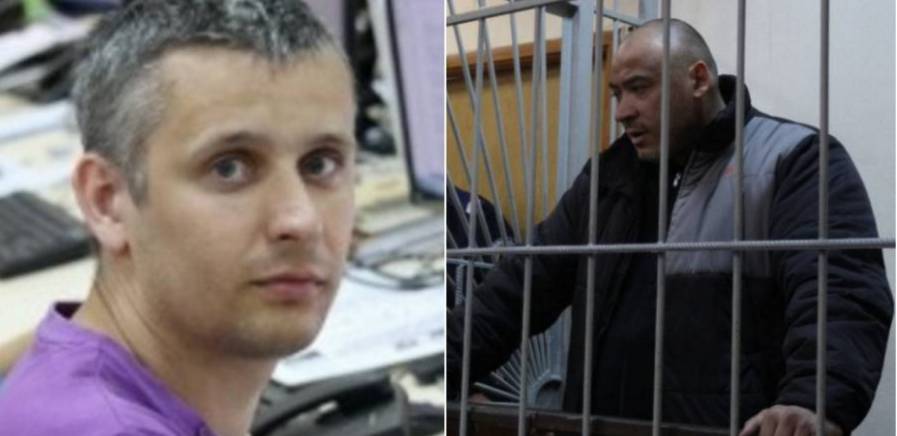• Topics / Law enforcement agencies
• Topics / Human Rights Violations associated with EuroMaidan
Accomplice to Maidan journalist killing has ’magic’ effect on Ukrainian judges

Yury Krysin admits taking part in the fatal attack on journalist Viacheslav Veremiy during Euromaidan and has been convicted of numerous other violent crimes. Yet “Ukrainian judges have only to see him and they’re seized by a burning desire to release him from custody”. Such a “magic” effect is how civic activist Maria Tomak describes Krysin’s latest success in avoiding custody. There are, unfortunately, grounds for suspecting that the same ‘magic’ can influence Ukrainian prosecutors as well, and for fearing that Krysin is being protected by high-ranking officers in the police force.
Tomak reports that on April 12, Krysin’s electronic bracelet was removed, meaning that a key suspect accused both of the attack on Veremiy, as well as of a serious firearms offence, is totally free. This is thanks to Judge Olena Kurova from the Solomiansk District Court in Kyiv. Without any grounds, she failed to set time for a preliminary hearing into the latest charges against Krysin. She also ignored the application of the Special Investigations Department investigating Maidan crimes to ensure that Krysin’s house arrest was automatically extended. The Maidan investigators were furious and threatened a “tough response” over apparent breach of the judge’s oath. Kurova does not appear to have been too perturbed, and Krysin has now been freed.
Tomak notes that Krysin’s magic appears to have worked best on Oleh Linnyk, a judge from the Shevkinsk District Court who not only released Krysin from custody, but even initially terminated the trial in the Veremiy case. As reported here, it has worked on other judges also.
43-year-old Krysin (‘Shkaf’) is originally from the Donetsk oblast and is believed to have been part of a criminal gang with links to Yury Ivanyushchenko, a former close associate of ex-President Viktor Yanukovych. Ivanyushchenko is suspected of playing a major role in providing the gangs of titushki or hired thugs used against Maidan activists. Krysin had moved to Kyiv many years before Maidan where he is believed to have been involved in various extortion and other criminal activities from 2009.
Krysin admits that he was one of the titushki involved in the attack on Viacheslav Veremiy, a 31-year-old Vesti journalist who was married with a small son. Veremiy and a colleague were pulled from a taxi in the centre of Kyiv during the early hours of Feb 19, 2014, and beaten with baseball bats. Although it is believed that Veremiy was shot and killed by Dzhalal Aliev (now in hiding) when he tried to escape, the video here demonstrates the potentially fatal savagery of the beating he was subjected to by Krysin and the others.
Krysin was remanded in custody on March 29, 2014, however was released into house arrest by a Prosecutor General’s Office investigator Yevhen Kotets after he, his wife and lawyer claimed that he was in danger of being killed in SIZO [the remand prison]. The ‘threats’ and elaborate extortion allegations were supposed to form the subject of a criminal investigation, however the lawyer representing Veremiy’s family constantly ran up against a brick wall when he asked for details about the ‘investigation’, and by December that year it transpired that none had been initiated.
The alleged threats were also used as an excuse to hold the court trial over Veremiy’s murder behind closed doors. That in turn made it easier to conceal certain other worrying developments.
In June 2014, Prosecutor General’s Office [PGO] prosecutor Yevhen Krasnozhon terminated the investigation under murder charges and initiated new proceedings in which Krysin is charged only with ‘hooliganism’
It should be stressed that three other titushki remain in custody on attempted murder charges over another incident which did not result in a fatality.
In August 2014, Krasnozhon supported Krysin’s lawyer’s application to the court to have his house arrest withdrawn. This was supposedly because Krysin had admitted guilt, had good character references and a pregnant wife and son. At a closed court hearing on Oct 14, 2014 judge Linnyk allowed the application and released Krysin on only a signed undertaking not to abscond.
There was protest over that and Interior Minister Arsen Avakov publicly demanded that proceedings be brought against the judge. Beyond such public outrage nothing happened and Krysin remained at liberty until his next arrest on extortion charges in May 2015. Despite having been under a restraint order on serious criminal charges when he committed the new offences, on March 17, 2016, he was convicted of a weapons-related offence and received a suspended sentence.
Although no criminal proceedings had been initiated over the alleged threats against Krysin, he had been given police protection. It is more than likely that he was under police guard when he committed that next crime.
He received a light suspended sentence and was still within the probation period when he was arrested again in August 2016 and remanded in custody on suspicion of heading a criminal gang making armed attempts to take over Narodna petrol stations. A combat grenade was found in his car, as well as operational material gathered about certain individuals which could only have come from the police.
On Dec 23, 2016, judges Ihor Palenyk, Denis Masenko and Oleh Prysyazhnyuk from the Kyiv Court of Appeal agreed to release Krysin from detention, placing him instead under house arrest. At the time, outraged lawyers representing Maidan victims pointed out that there was evidence that witnesses in Krysin’s prosecution had received text messages warning them to say that they’d seen nothing if questioned. Legitimate grounds for holding a person in custody include well-founded suspicion that the defendant will attempt to put pressure on witnesses.
Evidence of likely links and corruption motives explaining Krysin’s extraordinary ability to face and even admit serious crimes and remain at liberty have been reported





